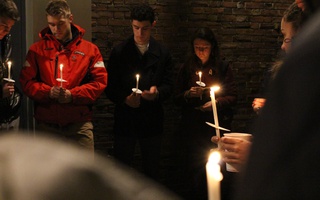Harvard Medical School professor Dan H. Barouch argued that developing a vaccine or cure would “most definitively” address the HIV/AIDS pandemic in the second installment of a lecture series on DNA at the Radcliffe Institute for Advanced Study.
Director of the Center for Virology and Vaccine Research at Beth Israel Deaconess Medical Center, Barouch spoke of the scope of HIV/AIDS compared to other well-known pandemics. He cited that HIV/AIDS has claimed an estimated 39 million lives, a figure surpassed only by the death toll from the Black Plague and the Plague of Justinian, according to Barouch. {shortcode-c44291bb53da7195ee1b055cfb5d7b7f95061ecf}
“The HIV epidemic is one of the most important biomedical challenges of our time, both locally and globally,” Barouch said.
Barouch said that while “clearly the vast burden of the disease is global,” HIV/AIDS still requires attention in the U.S. even though widespread social engagement with the issue has decreased since the 1980s, when the disease first appeared in large numbers in the country.
“Some cities have such a high HIV incidence rate they would actually qualify for U.S. PEPFAR [President's Emergency Plan for AIDS Relief] funding if they were in Africa,” Barouch said.
Barouch said progress towards a cure for HIV/AIDS has stagnated since the development of antiretroviral therapy in the 1990s. Only four potential therapy routes have been tested for efficacy in more than 30 years, three of which failed and one of which was only partially successful, according to Barouch.
“Clearly antiretroviral therapy is the backbone, and that’s absolutely necessary, but we also believe that it’s not sufficient—that antiretroviral therapy alone is not sufficient to cure disease,” Barouch said.
He added that even in the U.S., ART is not delivered to all people with HIV. According to recent date, less than half of those infected in the U.S. receive ART, a proportion which Barouch attributed to those having the disease not necessarily having access to health care.
Barouch also detailed many biological realities that render the cure discovery process challenging, including that unlike other viruses, HIV integrates into host DNA, thereby making HIV difficult to target. In addition, from an industrial standpoint, Barouch said pharmaceutical companies are less incentivized to produce a vaccine for HIV/AIDS, which would require a lengthy testing process and would be less profitable as a one-time treatment compared to lifelong drug therapies like ART.
When asked about what lessons could be drawn from research that aims to treat and cure HIV, Barouch said that “the fact that we haven’t wiped out the pandemic…speaks to our need to be humble.”
However, Barouch remained hopeful of finding a cure for the disease with perseverance.
“Bringing antiretroviral drugs to the developing world is probably the largest charitable contribution the Western world has ever made to the developing world,” Barouch said.
Barouch’s lab is developing a method to use an attenuated, or harmless, adenovirus as a vector to deliver antigens into the body to trigger immune response when infected with HIV.Read more in University News
EdX Course on Mao Raises Questions of PropagandaRecommended Articles
-
Beyond the Red RibbonAccording to the most recent global figures released by the United Nations, HIV/AIDS has taken the lives of over three million
-
Harvard Researchers Develop SIV VaccineResearchers at the Harvard-affiliated Beth Israel Deaconess Medical Center recently developed a vaccine for rhesus monkeys that provides immunity against the Simian Immunodeficiency Virus (SIV), a virus found in monkeys that is analogous to HIV.
-
HMS Researchers Make Progress Suppressing HIV In MonkeysIn a comprehensive study led by HMS professor Dan H. Barouch ’93, scientists were able to use specific antibodies taken from human HIV victims to suppress viral activity in monkeys infected with simian-human immunodeficiency virus. The study was published in the scientific journal Nature on Oct. 30.
-
 At Vigil, Harvard Honors World AIDS Day
At Vigil, Harvard Honors World AIDS Day -
 One Year After Initial Outbreak, Confirmed Mumps Cases Gone From Harvard
One Year After Initial Outbreak, Confirmed Mumps Cases Gone From Harvard













